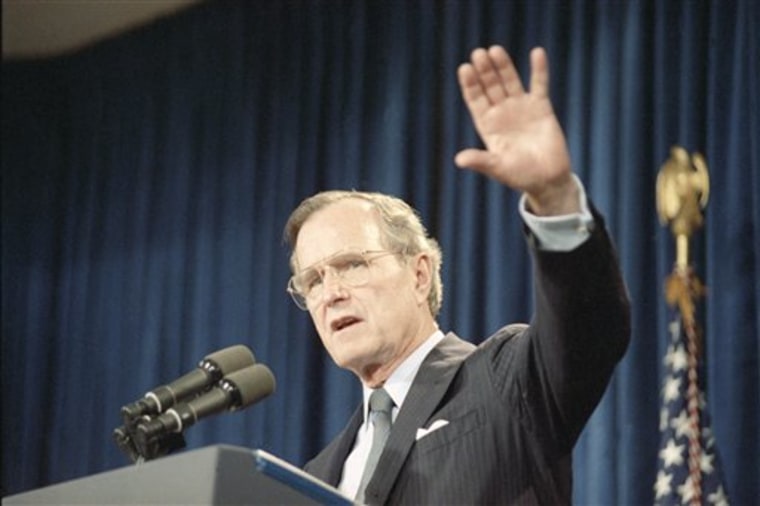This week former President George H.W. Bush was honored with the John F. Kennedy "Profile in Courage" award. He certainly deserves it. I recall praising his 1990 action to reduce the federal deficit in my San Francisco Examiner column. Here is what I wrote:
President Bush’s call this week for “new tax revenues” to bolster America’s fiscal security is not the first time an influential Republican changed his mind 180 degrees in the national interest.
Forty-seven years ago, Michigan Senator Arthur H. Vandenberg hosted governors Early Warren of California, Thomas E. Dewey of New York and Ohio’s Senator Robert “Mr. Republican” Taft at Mackinac Island to shape Republican foreign policy in the post-World War era. The result was the “Mackinac Charter,” an agreement that transformed the Republican party from decades of stuffy isolationism to a new, dynamic internationalism.
Today’s Republican president should both invoke and enjoy the precedent of this historic GOP turnaround. Because of what Vandenberg- a staunch go-it-aloner before Pearl Harbor- did and said, the modern, internationalist party of Dwight Eisenhower, Richard Nixon, Ronald Reagan, and yes, George Bush, was born.
As President Bush takes the heat for changing his position on taxes, he needs to recall this famous turnabout and the results it yielded. In half a century, no one has blamed the Grand Old Party for the betrayal of its isolationist orthodoxy. Instead, voters have rewarded Republicans for their timely, bipartisan support for the Marshall Plan and the North Atlantic treaty organization, which held the soviet bear at bay these past four decades.

This week, George Bush took the difficult step of ending the Republican Party’s economic isolationism. It was not much fun. Instead of asking the country as he did in 1988 to read his lips, he gave the media a chance to read us his clips- all those frisky statements he made as a candidate about never raising taxes.
The president gave two reasons for his change-of-heart: economics and politics. He said he needed the revenues to help cut the deficit. He couldn’t get those revenues without taking the heat personally.
What Mr. Bush did not mention, but should have, is a third reason for his dramatic switch on fiscal policy. It deals with the country’s international role. No American president can continue to meet with the leading industrialized nations, as Mr. Bush will in July, in a seat marked “World’s Biggest Deadbeat.” As a country, we cannot continue selling U.S. Treasury bonds on a world market simply to pay our government’s basic operating expenses and then expect to be treated as the globe’s post-Cold War leader.
The arithmetic is simple. Operating at an extremely high level of employment, the economy is generating federal revenues $160 billion below federal expenditures. To bring those two figured into balance, we need a bipartisan deal involving tax increases and spending cuts.
The politics of reducing the deficit is equally plain. After years of having their heads whacked, the Democrats have been turtle-like on taxes. If there’s to be action on taxes and spending, the Republican president has to take the first step. Before the Democrats would move to tighten “entitlements” and other federal spending spigots, they wanted to see the president’s hands firmly on the tax level. On Tuesday, to his credit, the president took the lead.
He declared his support for “tax revenue increases” and cited two reasons, “the size of the deficit problem” and the need for a budget plan “that can be enacted.”
What Mr. Bush’s terse statement did not acknowledge was the international import of his decision. With a few words on a White House press release this president has ended his party’s decade-old delusion that obtuse, “supply-side” ideology is a substitute for basic math, that the United States or any government can go on printing money that it lacks the political guts to collect from its own people and that we can be the planet’s biggest borrower and still call the shots when the big boys sit around the table.
What will be remembered long after this week’s rehash of old news clips and re-airings of old TV sound bites is one basic fact about the history made just this week: George Bush had the nerve to bring his party, kicking and screaming, into the harsh light of international, fiscal reality.
Like Arthur Vandenberg before him, he will be judged in the end not by his degree of consistency but by his faithfulness – in the end – to meeting the country’s needs.
